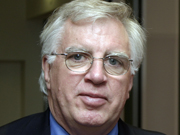Q&A with Joe Hansen, President of UNI and UFCW International

What does “Breaking Through” mean to you?
"Breaking Through" means it’s time to move beyond words and into action and take what we do to a higher level. With the work done at this World Congress, I feel confident that the UNI unions will leave with the tools to have an even greater impact as we go forward. Every day, our work is transforming the lives of workers across the globe. We are on the road to reaching a critical mass for the global worker movement.
What are you looking forward to at the UNI World Congress in Nagasaki?
The World Congress in Nagasaki is going to be an historic event for the global labour movement. I am very much looking forward to building on our past successes to move worker rights forward across the globe. The symbolism of the location of our meeting is an important reminder that cooperation and solidarity are at the core of our work together.
What would you say have been some of the highlights of UNI’s first 10 years?
UNI has done a tremendous job of merging four allied, yet distinct, organisations. We have brought workers across the service sectors into one organisation and by doing so, UNI has become more than the sum of its parts. UNI has reached landmark global agreements with major corporations that signify real power for workers. We have also engaged at the highest levels of these global corporations and the result has been positive change for workers.
What would you say are the key contributions that UNI has made to the international labour movement?
UNI has made contributions to workers across the globe. It brings organisations together to pool capacity and resources. We no longer fight alone and hope a global ally has our back. We move pressing agendas forward and we speak as one union with one voice across the globe. The work we are doing now with regards to Walmart’s proposed expansion into South Africa is a perfect example of this powerful solidarity.
How has the world of work changed in the last decade?
For workers in the service sector over the last decade, the adage “the more things change, the more things stay the same” applies. Technological advancements have changed the way we work and interact with each other. The workplace and the working conditions for millions of workers have improved over the past decade. Yet, the vast disparity between the rich and poor is growing wider in far too many places. Global corporations are growing, making it more challenging for any worker movement to fight and win in one geographic location. We need each other for support now more than ever.
What do you think are UNI’s key challenges for the future?
Clearly, employers and major corporations have become too rich and they are marshalling power and resources against workers. We need to be even more unified than ever. We need to look for every opportunity to support other workers and their campaigns.
What do you think are the key challenges for young workers and young union activists?
My union, the UFCW, has more young members than any other union in the United States and this is an issue we face on a daily basis. In my opinion, the challenge belongs on the shoulders of those of us who lead our unions. We need to make room for young workers at our strategy table, at the bargaining table, and at the head table. Young activists are the key to our future. They have the energy and the drive to make a difference. It’s up to us to make room for them to have a greater impact inside each of our unions and in UNI.

